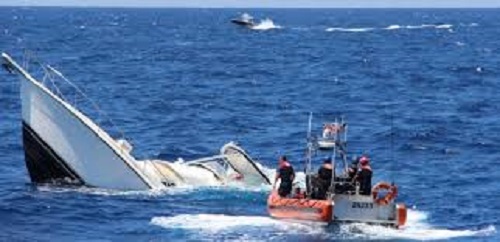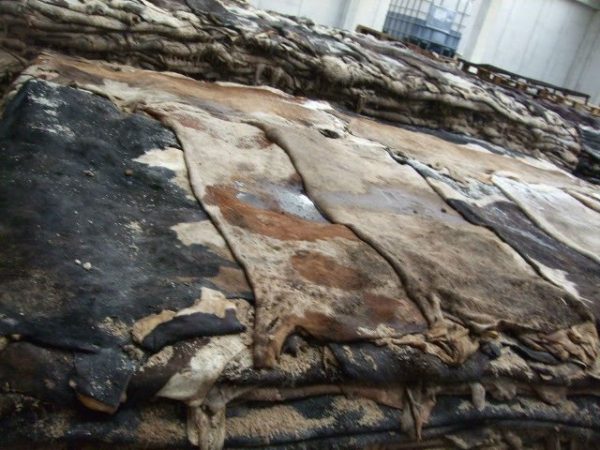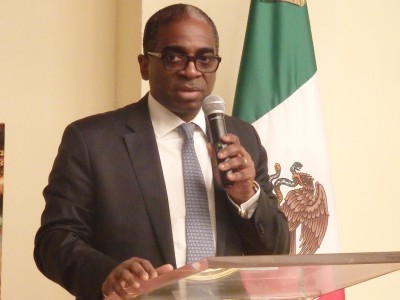Women And The Blue Economy – WIMA’s Perspective

Barr. (Mrs.) Jean Chiazor Anishere is the Principal Counsel, JEAN CHIAZOR & CO. Legal Practitioners, Notary Public & Arbitrators. She is also the President of African Women In Maritime (WIMAFRICA) Nigeria. Recently she delivered this paper at the 2nd Edition of Lagos International Maritime Week; on the potentials of the emerging blue economy in Africa with keen interest on the opportunities for African women. Enjoy it:
Introduction:
The Blue Economy is a developing world initiative pioneered by Small Island Developing States but relevant to all coastal states and countries with an interest in waters beyond national jurisdiction. It conceptualizes oceans as “Development Spaces” where spatial planning integrates conservation, sustainable use, oil and mineral wealth extraction, bio-prospecting, sustainable energy production and marine transport.
The Blue Economy breaks the mould of the business as usual “brown” development model where the oceans have been perceived as a means of free resource extraction and waste dumping; with costs externalized from economic calculations. It will incorporate ocean values and services into economic modeling and decision-making processes. The Blue Economy paradigm constitutes a sustainable development framework for developing countries addressing equity in access to, development of and the sharing of benefits from marine resources.
The blue economy aims to improve human well-being and social equity, while significantly reducing environmental risks and ecological scarcities; and it endorses the principles of low carbon, resource efficiency and social inclusion. It is grounded in a developing world context and fashioned to reflect the circumstances and needs of countries whose future resource base is marine.
Fundamental to this approach is the principle of equity ensuring that developing countries:
• Have their concerns and interests properly reflected in the development of seas beyond national jurisdiction; including the refinement of international governance mechanisms and their concerns as States proximate to seabed development.
• Optimize the benefits received from the development of their marine environments e.g. fishery agreements, bio-prospecting, oil and mineral extraction.
• Promote National equity, including gender equality, and in particular the generation of inclusive growth and decent jobs for all.
At the core of the Blue Economy concept is the de-coupling of socioeconomic development from environmental degradation. To accomplish this, the Blue Economy approach is founded upon the assessment and incorporation of the real value of the natural (blue) capital into all aspects of economic activity (conceptualization, planning, infrastructure development, trade, travel, renewable resource exploitation, energy production/consumption).
Efficiency and optimization of resource use are paramount whilst respecting environmental and ecological parameters. This includes where sustainable, the sourcing and usage of local raw materials and utilizing where feasible, “blue” low energy options to realize efficiencies and benefits as opposed to the business as usual “brown” scenario of high energy, low employment, and industrialized development model.
The Blue Economy approach recognizes and places renewed emphasis on the critical need for the international community to address effectively the sound management of resources in and beneath international waters by the further development and refinement of international law and ocean governance mechanisms. Every country must take its share of the responsibility to protect the high seas, which cover 64 % of the surface of our oceans and constitute more than 90% of their volume.
The minimal criteria to be included in a definition of a sustainable blue economy are:
Human needs- helping to secure all people’s need for food, water, energy, materials, creation and health, as well as jobs, livelihoods, community well-being and political stability.
Eco-system sustainability- ensuring that the ecosystem good and services are harvested , processed and use in such a way that this process does not result in any further decline, but result in any further decline, but rather improvement of ecosystem biodiversity and productivity.
A systems approach- applying tools of system thinking and modeling and integrated planning in a way that takes account the inter-linkages between and among different economic activities and ecosystems.
Sustainability standards- following global standards and guidelines for sustainable business operations, investment, and financing.
The Role Of The Organization Of African Women In Maritime (WIMAFRICA) On The Empowerment Of African Women In Maritime Towards Africaˊs Blue Economy
Various organizations have being formed to help nations attain a sustainable blue economy. For example; the ‘WIMAFRICA’. WIMAFRICA is an institutional framework for capacity building cooperation for capacity building, cooperation and entrepreneurship development of African women in maritime, through the creation of a specific grouping of women in the maritime sector with a vision of development, to effectively contribute to the achievement of the Agenda 2063 of the African Union, towards the African Blue Economy.
The mission of the WIMAfrica Organization is:-To encourage and stimulate the gender parity in the marine and maritime sectors, throughout Africa.
WIMAfrica aims to achieve this, through the implementation of:
a) A high standard strategy, which includes,
b) The promotion of targeted, comprehensive and continuous, investiment in educational initiatives in all the relevant sectors.
To fulfil the mission of the organization effectively, it has adopted the “ Think Globally, Act Locally” strategy by addressing opportunities and challenges of African Maritime Women, through the implementation of WIMAFRICA High Strategy By African Maritime Women Associations at the national leveland the National WIMAS are expected to implement this strategy through the local WIMAS ( Provincial Level)- Bottom up approach.
All national and all existing sub regional WIMASare called upon to endorse, approve and implement:
1. A women and youth oriented Maritime Knowledge & Academics Initiative (MKAI) at National and Sub-regional levels (to encourage women, youths and young adults to develop an interest in the marine and maritime fields);
2. Development of an integrated management of African coastal zones (with the participation of the communities, particularly, the involvement of women) to ensure good governance, ecosystem health and sustainability;
3. Development & implementation of a coherent & comprehensive WIMA reporting system (local-National-Sub-regional-Continental levels).
WIMA’s Strategic Direction For The Next Five Year Period
The development & implementation of a sustainable Marine & Maritime Gender Policy Framework, (in accordance with the relevant regulation. & international agreements) which includes:
Promoting youth and women-oriented maritime training and education throughout the region.
Reg. policy/strategy addressing all specific aspects related to the gender participation in the building of Africa’s Blue Economy (at national & local levels).
Priority: WIMAFRICA’s participation in the Benguela current commission activities: WIMA policy/strategy to assist the national relevant authorities (Angola, Namibia & South Africa) in countering illegal, unregulated, unreported (IUU) fishing at national level (OBS.: replication of the existing successful Institutional Framework –” Fish I Network” [East Africa]. I.e. Tanzania & Mozambique experiences to be applied 1st to the Benguela Large Marine Ecosystem [BCLME] zone, and later on to the Guinea Current Large Marine Ecosystem [GCLME] region).
Development of a comprehensive Research Initiative Mechanism (RMI) for WIMAFRICA to champion the promotion and sharing of Best Practices within Africa’s marine and maritime sectors (in close coop w/ the Nat. & Reg. Maritime Education Institutions: RMU [Accra] & ARSTM [Abidjan]), including: Dissemination of info for public’s overall understanding regarding, inter alia, the role, challenges, opportunities in the marine & maritime field (at all levels: local, national, sub-regional & continental.
Conclusion
The Blue Economy initiative is a welcome strategy to facilitate trade amongst nations and help nations to sustain its economy. Since the implementation of the Blue Economy strategies will help countries to secure all people’s need for food, water, energy, materials, creation and health, as well as jobs, livelihoods, community well-being and political stability.
It will and has also lead to Global Trade Alliance which represents an important step towards reinvigorating global trade, contributing to private sector development, investments, market integration, education and employment. It has helped to expose the deficiencies in the economies of the world and how best to address the issues.







